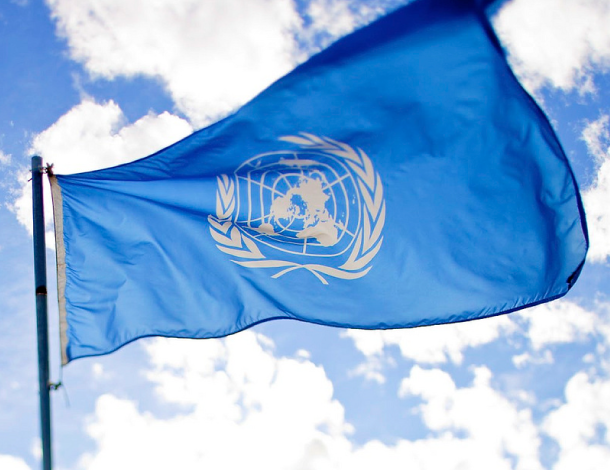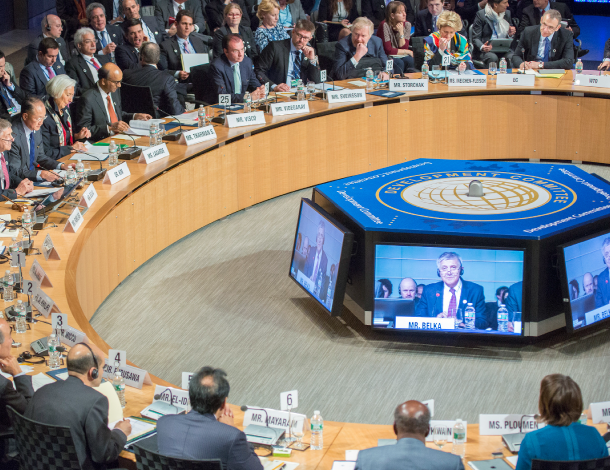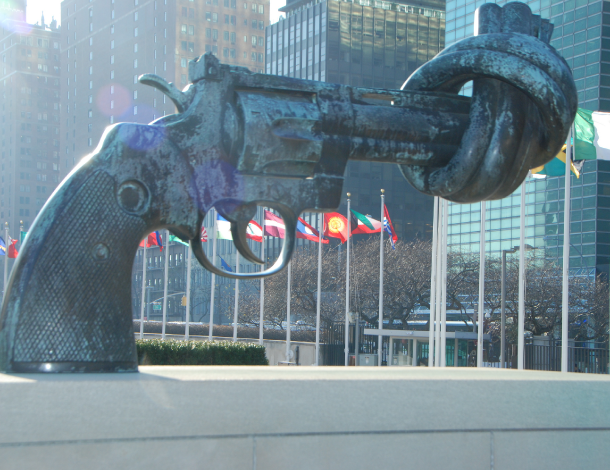Black Panther, the film, presents the United Nations as a peaceful alternative to an armed revolution. But can this intergovernmental institution truly live up to such expectations?

I am not your average United Nations person. Hand-written signs and painted banners have been my site of politics for much longer. Chanting on the streets is more familiar to me than reading statements in the UN Human Rights Council. It is thanks to my work in a global feminist organization that I get to go to the UN. I have a fancy annual pass and an anthropological perspective on what I encounter there.
In the film Black Panther, the UN is the starting place for changing the world. The peaceful way, as opposed to an armed revolution, waging war and launching missiles. But can the UN truly be a place of hope for a better future? Can it be the place to fight for change, for decolonization, for justice?
In reality, the international human rights system is at risk.
First, it is under persistent attack from “anti-rights actors” - ultra-conservative and religious fundamentalists. In the past, the international human rights system had provided opportunities for setting advanced human rights standards that have influenced, to an extent, country-level policies and practices. Excluded and marginalized groups, including women, LGBTQI, ethnic minorities and Indigenous people, have made significant achievements in this framework. Today, it is more about pushing back and simply holding the line.
Under rather innocent-sounding and family-oriented names, anti-rights actors have been increasing their presence at the UN. Groups like the Center for Family and Human Rights (C-Fam), World Congress of Families, Russian Orthodox Church, and World Youth Council are coordinated across regions and religions, and are extremely well-funded. “Rights at Risk”, the 2017 Trends Report by the Observatory on the Universality of Rights (OURs) explains exactly how these actors work by manipulating concepts around religion, culture and tradition, in order to undermine and co-opt our human rights system.
“Protection of the family” is a favourite item on their agenda, and under this guise , anti-rights actors promote dangerous patriarchal and heteronormative positions and policy frameworks. In this narrative, discrimination and violence against women are not perceived as such, coercion and violence against family members is a non-issue, persecution of LGBTQI people doesn’t need any ‘special’ attention, abortion is criminal and sexual education is imperialistic.
Second, the international human rights system is in the midst of corporate capture. Because the UN is experiencing funding difficulties, the incredible wealth of the private sector has become a desirable solution. The threat here is not only in economic influence that becomes political. It is also in shaping narrative and ideology: basic rights now need a “business case” and must be justified in profit-oriented market terms.
We are told by UN officials and private sector representatives that there are no strings attached to this funding, and that the independence of UN institutions are guaranteed. Yet, it would be naïve – if not dishonest – for us to believe that millions of dollars in funding come without any political influence. Or that big business will shy away from using that influence to protect their interests when they come into conflict with human rights. This is conflict of interests, and the reason why civil society organizations point out the private sector must not be allowed to buy influence in the UN.
Corporate interests often prevail over human rights, public health, and the environment. For example, cheap labour and precarious working conditions; pharmaceutical companies raising prices of life-saving medicine even if it literally kills millions of people; pollution of air and contamination of water to save money on more expensive environmentally friendly technologies; forcefully displacing entire villages and communities to exploit their natural resources, while systematically violating the right of communities to free, prior and informed consent. What’s more, these forms of violence are often wrapped as a gift, in the language of development, progress, and job creation.
Our international financial system is already built to privilege big business and transnational corporations. From tax cuts and illicit financial flows, which is basically money stolen from the public, to investor-state dispute-settlement mechanisms that allow companies to take states to court (but don’t allow states or communities to take companies to court for human rights abuses). The increasing economic and political power of big business in national and international policy forums such as the United Nations make corporate regulation and accountability even more difficult to obtain in the future.

Third, development aid is not inherently a good thing, as Black Panther, the film, seems to suggest. Consider development money that goes to either private or state-owned companies that expel communities from their lands and take away their livelihoods in order to extract natural resources. The companies then send armed soldiers to crush any community resistance, and force them to sign “consent forms” at gunpoint. When Societe AngloGold Ashanti de Guinee decided they want to mine gold in northeastern Guinea in 2015, they even shot a school girl in the back as she was walking home as an extra deterrent. As the the report Unjust Enrichment: How the IFC Profits from Land Grabbing in Africa details, there are good reasons to believe this was done with a loan from World Bank’s private investment arm, International Financial Corporation (IFC). Meanwhile, the World Bank’s mission is to end poverty.
I listened carefully to the UN speech the Black Panther delivers in the film, not so different from other speeches one hears in the real-life UN. “There is more that unites us than divides us” is a rather mild message, if not outright cliché. Yet, in the era of Trump and crowds chanting ‘build the wall’, a call for unity over division can sound almost radical. The recognition that human societies necessitate togetherness and inter-dependence is surely some steps ahead of the impulse to destruction. But we really should watch out that they don’t lead to exactly the same results.
Well-meaning liberals nod approvingly at these kinds of speeches. Yet the real question is, how will all those respectable, formally dressed and well-groomed people vote, when it comes to actual decisions on protection for human rights defenders? On respecting the rights of Indigenous people, migrants and refugees? On sexual and reproductive health and rights? On violence against women, on LGBTQI rights? On holding corporations to account for human rights abuse? (Check how your country is voting on these resolutions to find out.)
So can the UN be a place to fight for change, for decolonization, for justice?

The answer is obvious: it already is, and it is just one place among many. The UN is an intergovernmental forum, a place for states. Social movements can, have, and will continue to influence it. Through direct engagement and through those they choose to lead their states (if they are in the position to make that choice). Even as we recognize the limitations and the reactionary trends. Even as many of us are skeptical about changing the system from within. Even as our struggles take place far beyond the UN.
But let our imagination not stop in the UN, where Black Panther ends. Wakanda gives a glimpse into a past that could have been possible, were it not for colonial and neo-colonial projects of capitalism and white supremacy; but it is also a glimpse into a future that can still be possible (unless we totally destroy the planet first).
A new era will not emerge from those sterile rooms and long corridors in Geneva and New York (forgive me for stating the obvious.) Let us imagine new multilateral and international systems, even as we continue engaging in the existing international human rights system. Let us imagine feminist political forums not dominated by former colonial powers and their present interests. Let us imagine forums where the people – not states and corporations – have the power. A world that isn’t organized by nation-states at all. Where one’s access to positions of power aren’t determined by royalty institutions and birth-privilege.
Black Panther reminds us: imagination is where change begins.
